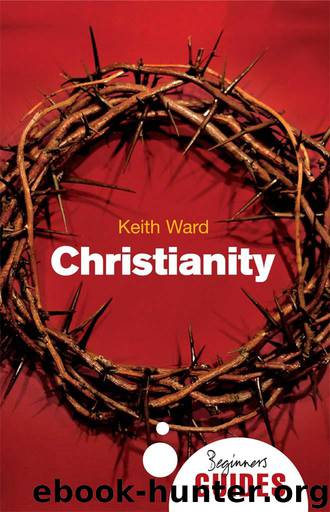Christianity: A Beginner's Guide (Beginner's Guides) by Keith Ward

Author:Keith Ward
Language: eng
Format: mobi, epub
ISBN: 9781780741390
Publisher: Oneworld Publications
Published: 2012-12-01T00:00:00+00:00
First view: The Church as a sacramental community
One major view is that represented by the Roman Catholic Church, the largest Christian denomination. Since the church is the body of Christ (1 Corinthians 12:27), and is meant to be an agent of divine reconciliation, the church should be visibly united. One cannot have a divided church, and so there must be a visible symbol and guarantee of the church’s unity. That is the Pope, the Bishop of Rome, who is by tradition the successor of Peter (Petrus), of whom Jesus said that he (or his declaration that Jesus was the Christ) would be the rock (Petra) on whom the church would be founded (Matthew 16:18).
The Roman Catholic doctrine of the Papacy has developed considerably over the centuries, but the view now is that the Pope is the chief pastor and teacher of the whole church. He is protected from error (i.e. is infallible) when solemnly defining any matter of faith and morals, and no authentic decision of the church on such matters can be made without him. He is the Vicar of Christ, and ultimately all authority in the church flows from him, as the representative of Christ on earth.
The Pope nevertheless does not usually define matters of faith on his own, but convenes ecumenical (worldwide) Councils of Bishops, who are the successors of the twelve apostles, and whose decisions, when understood to be ratified by the Pope, are binding on the whole church. The bishops guarantee that the church is truly ‘apostolic’, that is, validly descended by the imposition of hands from the first apostles, and so the church can be trusted to continue and develop the apostolic teaching, derived from Jesus himself.
On the Roman Catholic view, the church has a teaching authority (a magisterium), given by God, to preserve and amplify the teaching which God gave in Jesus, and faithful Catholics have a duty to accept this teaching as having divine authority. Nevertheless, this is not in practice the most important aspect of the life of the Catholic Church. For most Catholics, it is the sacramental life of the church which counts most. By baptism, in which water is usually poured on the forehead of a child in the name of the Trinity, God receives children into the redeemed community, and purifies them of the guilt of original sin. In confirmation, when the Bishop lays his hands on the heads of candidates, God gives the grace of the Holy Spirit to help one in the practice of the Christian life. In marriage, by their mutual vows and by the blessing of a priest, couples are joined by God into a union of ‘one flesh’. In confession, the priest has authority to declare the sins of the faithful forgiven. In unction, by anointing with oil and prayer, the soul is prepared for death. In ordination, by the laying on of hands, priests are set apart to offer the sacrifice of the Mass. And most importantly, in the Mass bread and
Download
Christianity: A Beginner's Guide (Beginner's Guides) by Keith Ward.epub
This site does not store any files on its server. We only index and link to content provided by other sites. Please contact the content providers to delete copyright contents if any and email us, we'll remove relevant links or contents immediately.
| Buddhism | Christianity |
| Ethnic & Tribal | General |
| Hinduism | Islam |
| Judaism | New Age, Mythology & Occult |
| Religion, Politics & State |
Cecilia; Or, Memoirs of an Heiress — Volume 1 by Fanny Burney(31332)
Cecilia; Or, Memoirs of an Heiress — Volume 3 by Fanny Burney(30934)
Cecilia; Or, Memoirs of an Heiress — Volume 2 by Fanny Burney(30889)
The Secret History by Donna Tartt(16623)
Sapiens: A Brief History of Humankind by Yuval Noah Harari(13053)
Leonardo da Vinci by Walter Isaacson(11903)
The Radium Girls by Kate Moore(10907)
Sapiens by Yuval Noah Harari(4537)
The Wind in My Hair by Masih Alinejad(4424)
How Democracies Die by Steven Levitsky & Daniel Ziblatt(4398)
Homo Deus: A Brief History of Tomorrow by Yuval Noah Harari(4279)
Endurance: Shackleton's Incredible Voyage by Alfred Lansing(3844)
The Silk Roads by Peter Frankopan(3760)
Man's Search for Meaning by Viktor Frankl(3631)
Millionaire: The Philanderer, Gambler, and Duelist Who Invented Modern Finance by Janet Gleeson(3569)
The Rape of Nanking by Iris Chang(3516)
Hitler in Los Angeles by Steven J. Ross(3437)
The Motorcycle Diaries by Ernesto Che Guevara(3332)
Joan of Arc by Mary Gordon(3258)
